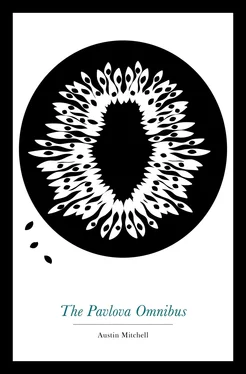Austin Mitchell - The Pavlova Omnibus
Здесь есть возможность читать онлайн «Austin Mitchell - The Pavlova Omnibus» — ознакомительный отрывок электронной книги совершенно бесплатно, а после прочтения отрывка купить полную версию. В некоторых случаях можно слушать аудио, скачать через торрент в формате fb2 и присутствует краткое содержание. Жанр: unrecognised, на английском языке. Описание произведения, (предисловие) а так же отзывы посетителей доступны на портале библиотеки ЛибКат.
- Название:The Pavlova Omnibus
- Автор:
- Жанр:
- Год:неизвестен
- ISBN:нет данных
- Рейтинг книги:5 / 5. Голосов: 1
-
Избранное:Добавить в избранное
- Отзывы:
-
Ваша оценка:
- 100
- 1
- 2
- 3
- 4
- 5
The Pavlova Omnibus: краткое содержание, описание и аннотация
Предлагаем к чтению аннотацию, описание, краткое содержание или предисловие (зависит от того, что написал сам автор книги «The Pavlova Omnibus»). Если вы не нашли необходимую информацию о книге — напишите в комментариях, мы постараемся отыскать её.
The Pavlova Omnibus — читать онлайн ознакомительный отрывок
Ниже представлен текст книги, разбитый по страницам. Система сохранения места последней прочитанной страницы, позволяет с удобством читать онлайн бесплатно книгу «The Pavlova Omnibus», без необходимости каждый раз заново искать на чём Вы остановились. Поставьте закладку, и сможете в любой момент перейти на страницу, на которой закончили чтение.
Интервал:
Закладка:
Mr Speaker: Order. We should not have more than ten people speaking at once.
Mr Walker: I should like to hear the Deputy Leader of the Opposition deny that.
Hon H. Watt: I deny it.
Mr Walker: I should like to hear him deny that Memorial Avenue in Christchurch ….
Hon. H. Watt: That is not a motorway.
Mr Walker: It is a mini-motorway.
Such is the lightning flash of free debate and the challenge of the interplay of ideas.
Though honest and far from glib, our politicians are not guileless, so use this parliamentary terms guide:
TERM: ‘I withdraw.’ TRANSLATION: ‘My allegations are almost certainly true and will stick anyway, now that I’ve made them publicly, but since the Speaker is one of their party hacks not ours, I’ll have to pretend to disavow them in order to get on to the more damning allegations of dishonesty and malpractice later on in my speech.’
TERM: ‘That’s not correct.’ TRANSLATION: ‘He’s right, but by the time they’ve checked, the whole business will be forgotten.’
TERM: ‘The minister is out of touch with his electorate.’ TRANSLATION: ‘My God he’s a good minister—there must be some way of getting at him.’
TERM: ‘I would require notice of that question.’ TRANSLATION: ‘I haven’t the foggiest idea.’
TERM: ‘The member is making debating points.’ TRANSLATION: ‘My God he’s right.’
TERM: ‘Ministers are constantly tripping round the world.’ TRANSLATION: ‘It’s now long enough for them to have forgotten how many we had.’
TERM: ‘A full and frank exchange of views with the American President.’ TRANSLATION: ‘I
got my orders.
TERM: ‘Making a political football out of a complex issue.’ TRANSLATION: ‘They’re on to a good thing.’
TERM: ‘The people will not fall prey to glittering bribes.’ TRANSLATION: ‘We’ve not got much of a policy this time.’
TERM: ‘I wouldn’t stoop to deal with such tawdry accusations.’ TRANSLATION: ‘I couldn’t.’
TERM: ‘I don’t want to use my full time.’ TRANSLATION: ‘I shall only want a short extension.’
TERM: ‘Despite their attempt to discover new policies the other side of the House haven’t changed basically.’ TRANSLATION: ‘How come we’ve nothing new to throw at them.’
TERM: ‘This is no time for defeatist talk.’ TRANSLATION: ‘We’ve got the country into a mess.’
TERM: ‘That question does not follow from the first.’ TRANSLATION: ‘Good heavens, they forgot to brief me on that.’
TERM: ‘I call on the Government to resign.’ TRANSLATION: ‘I’ve run out of ammunition.’
TERM: ‘The Opposition opposed the sale of state houses.’ TRANSLATION: ‘We’ve got to get them off the housing problem. They’ve got too strong a point.’
To change the subject from Parliament, as Mrs Kirk would say, we have a fourth stage of government, People’s Democracy, though we should perhaps omit ‘people’s’—it worries Brigadier Gilbert, even with the P.D.S.A. Every third year, in November, power passes to you personally, though you may have to share it with up to one and a half million others, depending on how many bother to vote. Only now will you realise the full promise of New Zealand politics for they have the most promising politicians in the world. There is no corruption: they aren’t the kind of politicians people would want to vote twice for. Besides, the New Zealander rarely puts cash down. Time payment is the system with politics as with cars. Win now, pay later.
Elections have little to do with politics. They are the local variant of that vital Pacific religious phenomenon, the Cargo Cult. Only in New Zealand does it reach the full apogee of its development. The cargo promised is more lavish and, instead of one prophet to promise it, the Kiwi can choose between three. Ministers who have been arguing the need for discipline, effort and restraint will suddenly discover that things have never been better. The country is moving to a limitless future given the continuation of present policies. Even Mr Muldoon will hover, momentarily, on the brink of a smile as his eyes move away from the television interviewer to seek out the camera. The Opposition, after three years of complaining about current messes and looming difficulties, will find that with a little painless correction administered by them, all will be well. Social Credit prophets, always inclined to inflation, will outbid both the others.
The rites are the same as in any other Pacific Island. The cargo is the same: cars (you will begin to feel like buying one), houses, cheap credit. You name it and if it’s not against the moral code it’s coming. Even if it is, the politicians will hold out imprecise hopes of a change in the code. Unfortunately, the electors only half-believe the promises. The age of faith died with Michael Joseph Savage, a political Liberace of his time. Now politicians have to promise ever more strenuously so they can combat disbelief.
Elections have occurred so regularly for so long that they are now firmly implanted on the collective subconsciousness. Like Pavlov’s doggies, New Zealanders would still find themselves in orderly queues outside polling booths on the last Saturday in November every third year if Tom Pearce seized power and cancelled elections as a distraction from rugby. Kiwis abroad tramp alien streets looking for a polling booth because some deep tribal instinct stirs within them.
Kiwis vote for non-political reasons. Keep politics out of elections. Broadcasting has already gone too far by calling in professors of political science to comment on the inaction like a Greek chorus which has wandered into a low class burlesque house by mistake. The scientists hover over the electorate like the Four Horsemen of the Apocalypse, only more portentously—and mercifully more briefly. They then return to their studies to carry out a detailed analysis which fails to emerge before the next election. They should stick to games-theory analyses of the New Zealand Rugby Union. New Zealand elections are the province of professors of anthropology and religious studies. They at least are trained to understand tribal ceremonies.
New Zealand political institutions are like any other local industry. The plant is small, outdated and orginally imported, though the rulers have tinkered with it, scrapping the Legislative Council packing room here, adding an Ombudsman machine there. Production is strictly for the home market. And it is heavily protected, otherwise Mr Lee Kuan Yew might take over and run the country on a part-time basis from his head office in Singapore. The real difference from similar industries overseas is the way the local staff, the ‘politicians’, run the plant.
Genus Politicus New Zealandiensis is not under flora so he must come under fauna. He is not a unique element in the local fauna, though the type is rapidly becoming extinct overseas, where it has been hunted down and pushed out by ruthless professionals. The British think of their politicians as an élite distinguished by ability and intellect. The Americans think of their politicians as corrupt; the honest politician is one who, when bought, stays bought. In New Zealand honesty is the norm, a testimony to lack of imagination and the unsaleability of the product rather than superior virtue. Politicians are essentially the ordinary bloke. The prime requirement is neither intellect nor ability but that of being (or appearing to be) a good bloke. In politics the good bloke syndrome finds its highest expression. The best politician is the one who blends most harmoniously into the Kiwi background.
In each party, selection of candidates is in the hands of party members who can be guaranteed to pick people like themselves. Like the selector, the candidate must live in the electorate so they’ll know if he looks after his garden. He must have a wife whose looks and social poise won’t make the homeliest selector feel threatened. Children and a dog are desirable for featuring on householder pamphlets and press publicity (in rural electorates add one more child and leave the dog off). He should preferably have attracted attention by his assiduous committee joining, by activity for appropriately wholesome causes, and by being seen at the RSA He should display no hint of any abnormality in education, of superior intellect or peculiar sexual inclination. The unusual frightens New Zealanders; the like reassures them. They will seek it out and stick to it with determination. Abnormalities should be disguised by frenzied housebuilding, concreting, or if possible, breaking-in of land. It is advisable to have had several jobs. This is known as valuable experience. [*]
Читать дальшеИнтервал:
Закладка:
Похожие книги на «The Pavlova Omnibus»
Представляем Вашему вниманию похожие книги на «The Pavlova Omnibus» списком для выбора. Мы отобрали схожую по названию и смыслу литературу в надежде предоставить читателям больше вариантов отыскать новые, интересные, ещё непрочитанные произведения.
Обсуждение, отзывы о книге «The Pavlova Omnibus» и просто собственные мнения читателей. Оставьте ваши комментарии, напишите, что Вы думаете о произведении, его смысле или главных героях. Укажите что конкретно понравилось, а что нет, и почему Вы так считаете.












